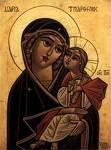Americans’ hear the phrase September 11th—or 9/11: the more popular term—as the day that Al-Qaeda terrorists hijacked several planes that crashed into the Twin Towers of the World Trade Center in New York City and the Pentagon in Northern Virginia, killing almost three thousand people. It was a time of fear, uncertainty, and heartbreak. It was a time when every single person in the nation dialed numbers of loved ones to only get a perpetual busy single. It was a time when all eyes were mesmerized by breaking news delivered by the frantic anchormen.
But September 11th meant something else to the Coptic community other than a day of mourning. It was a day of celebration: The Feast of the Nayrouz. The Nayrouz serves both as the Coptic New Years Day and the feast and commemoration of the martyrs of the Church. Due to the persecution lead by Diocletian, the most brutal persecution delivered by the Roman Empire against Christians, the Coptic Orthodox Church decided to start the Coptic Year beginning the day that Diocletian took the throne in 284AD.
I know, it sounds morbid to joyously celebrate the murder of so many members of the congregation by those who hated and despised us. However, the Coptic Church is known as “the Church of the Martyrs.” According to History of the Church by modern historian Butcher, she states: “if in the world there were six wonders, then the seventh and greatest wonder would be the Coptic Orthodox Church. For despite the many attempts to remove it, and destroy it, and the thousands of martyrs it has presented so that their blood went up to the knees of the horses, yet it has remained steadfast, spread and grown.”
We embrace those who were strong enough to look death in its multiple faces—a metallic tip of a sword or a black barrel of a gun—and proclaim their love for Christ, knowing that action is the greatest tangible love of all: dying for someone you love. We intercede to them and learn about their stories to inspire us to have a better relationship with God.
And in Egypt, they live that reality every day.
The daily persecution of our Coptic brothers and sisters in the motherland comes in many forms. In Upper Egypt, it’s more common to hear of kidnappings, tortures and murders, and forced conversions to Islam. In Lower Egypt, it’s more common to persecute through the death of your career. When an employer sees on your identification card that you are Christian, or simply hearing your name and knowing that your name could be nothing else but Christian, you will be denied that promotion you deserved; or that prominent position you interviewed for. It’s as guaranteed as oxygen in the air.
Take my father for example. My father, the valedictorian of his high school, went off to college and for three years had optimum grades to get an assistantship in his university, which would lead to becoming a professor—a rather prestigious position in Egypt. Magically in his fourth year, when you are picked for assistantships, his overall grades dropped. Not by his means, but somewhere between his graded exams and the filing cabinet, his grades lowered just enough for him to be ineligible for an assistantship. Coincidence? Ha, nice try.
If anyone needs the reminder of the Feast of the Nayrouz, it’s us who live in the Diaspora. Because, let’s face it: living in America where your average decision making skills are tested by whether you’re going to add whip cream, extra syrup, or switch to nonfat milk for your five dollar Starbucks coffee doesn’t test your faith. Neither does sitting outside at two o’clock in the morning on Black Friday to get the iTouch or the latest Wii game. Living the life in the land of the free and the home of the brave has spoiled our outlook on life.
But then again, eight years ago on the very day we are to celebrate our martyrs, America faced a fear so paralyzing that all we could do was lay our head in our hands and pray. I hope that our community can look at both significant events of 9/11 and embrace a relationship with God that we couldn’t have had before.
Subscribe to:
Post Comments (Atom)











No comments:
Post a Comment